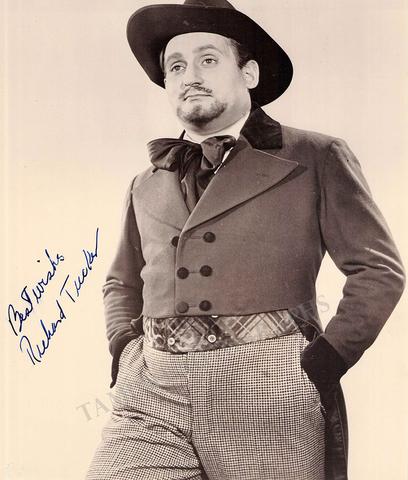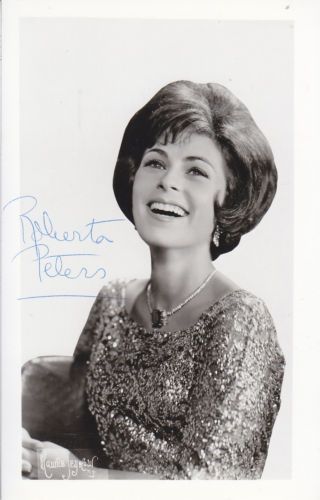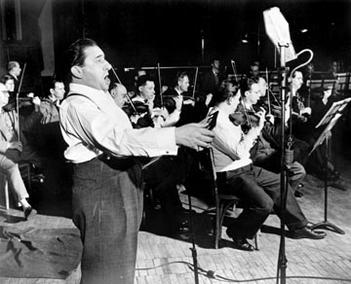|
SATURDEE OPRY LINKS 45:
Passover Edition
  
Richard Tucker
Roberta Peters
Jan Peerce
Saturdee Opry Links Overture!
"La Juive," by Halevy.
https://www.youtube.com/watch?v=VMc0eoyoH6Q
About the composer:
https://en.wikipedia.org/wiki/Fromental_Hal%C3%A9vy
1.
"La Juive" ("The Jewess") is a first-tier opera by one Fromentel Halevy that has
been revived in recent years following a long fallow period. A great success in
its 1835 premiere, it became a cornerstone of French opera for over a century
(and was greatly admired, in a bizarre irony, by Richard Wagner.) It's a Romeo
and Juliet situation between the title character and a prince. Rachel's father,
Eleazar, who adopted her as a child and raised her as a Jew, condemns the love,
but when the tryst is revealed, both are arrested by the Cardinal. They can be
saved by only one thing: conversion to Christianity. The two refuse and are led
to their death. After "The Jewess" is executed, Eleazar reveals the terrible
truth: the Cardinal was the woman's real father. He is then executed. The opera
has long been viewed as a tortured plea for religious tolerance. Here is Neil
Shicoff with a tremendous performance of the aria, "Rachel! quand du Seigneur."
https://www.youtube.com/watch?v=nrr0WJnL-GQ
Synopsis : Eléazar's daughter Rachel has been condemned to death by Cardinal de
Brogni for consorting with the Christian prince Léopold. However, Brogni does
not realize that Rachel is actually his own daughter, saved from a fire in Roman
years ago by Eléazar and raised as Eléazar's own daughter. Eléazar knows he can
save her life by revealing this fact, but he is unable to reconcile his Jewish
faith with forcing his daughter to change her faith.
Approximate Translation:
Rachel, when from the Lord
the tutelary grace
to my trembling hands
entrusted your cradle,
I had to your happiness devoted my whole life.
And it's me who delivers you to the executioner!
But I hear a voice shouting at me:
Save me from the death that awaits me!
I am young and I want to live,
O my father, spare your child!
I am young and I want to live,
O my father, O my father, spare your child!
Ah! Rachel, when from the Lord
the tutelary grace
to my trembling hands
entrusted your cradle,
I had to your happiness devoted my whole life.
And it's me who delivers you to the executioner.
Rachel, I'll give you to the executioner!
Rachel, it's me, me
I who delivers you to the executioner!
And a word,
and a word stopping the sentence,
of a word stopping the sentence
I can save you from death!
Ah, I abjure forever my revenge,
Rachel, no, you will not die!
2.
Here is the principal soprano aria from Halevy's "La Juive," an alternately
fretting and hopeful affair in which Rachel wonders about the identity of the
man she loves, and whether he is Jewish. "Il Va Venir" ("He Will Come.") The
great French soprano Regina Crespin sings this understated aria, that, to these
ears, seems to foreshadow Verdi.
Setting: a room in Eléazar's house, Constance, Switzerland, 1414 during Passover
Synopsis: Rachel is filed with worry and apprehension over her impending meeting
with Léopold, whom she believes to be Samuel, a Jewish workman. Although she is
fond of him, she has suspicions about him because of his behaviour at the
Passover feast. In fact, he is a Christian prince of the Empire and married.
https://www.youtube.com/watch?v=QBll3syk1Uo
Translation:
He will come!
and with fright I feel myself shudder.
My soul, alas, is oppressed.
My heart beats, but no pleasure ...
And cepedant, he will come!
The night and the silence,
the storm coming
increase my terror.
The fear, the distrust
take hold of my heart!
Every step makes me flinch!
I was able to deceive the eyes of a father,
but my not those of a severe God.
French:
Il va venir!
et d'effroi je me sens frémir.
Mon ame, hélas, est oppressée.
Mon coeur bat, mais non de plaisir...
Et cepedant, il va venir!
La nuit et le silence,
l'orage qui s'avance
augmentent ma terreur.
L'effroi, la défiance
s'emparent de mon coeur!
Chaque pas me fait tressaillir!
J'ai pu tromper les yeux d'un père,
mais mon pas ceux d'un Dieu sévere.
About Ms. Crespin:
https://en.wikipedia.org/wiki/R%C3%A9gine_Crespin
3.
Here is Jacob Pincus Perelmuth, who was so lucky that his parents emigrated from
Poland to the U.S. in 1903. Perlmuth eventually became the mighty tenor, Jan
Peerce. Here is a great clip of him singing "O Paradiso," which this country
certainly was for his family, from "L'Africaine," (1865) by Meyerbeer. (You'll
have to turn this up to hear it well.) The opera is about fictitious events in
the life of the real Vasco da Gama (1460s – 1524) the Portuguese explorer. He
was the first European to reach India by sea.
https://www.youtube.com/watch?v=Mop4ADLW0EY
Synopsis:
It tells the story of the noble Inez and her love Vasco da Gama. Her father
forces her to marry Don Pedro instead. Da Gama comes before the court and asks
for permission to embark on an expedition to a new world. When he is refused,
there is a fight and Da Gama is imprisoned. Through a series of events, Da Gama
is rescued by one of his slaves from the New World named Selika, who loves him.
She brings him back to her island, where he is captured for execution. It is
after he is captured that he looks out over the island and sings “O, Paradiso,”
overcome with wonder at the island’s beauty.
Translation:
A Paradise
My heart throbs…wondrous scene !
At last I embrace you, land that I’ve dreamed of !
A paradise, emerging from the sea,
Flowering earth, brilliant sun,
I’m entranced by you !
You belong to me !
Oh new world,
I can offer you to my homeland !
This fertile earth is ours,
Which can enrich all Europe !
Wondrous scene !
You fascinate me !
Oh new world,
You belong to me !
To me!
Italian:
Mi batte il cor!
spettacol divin
sognata terra ecco ti premo al fin
o paradiso
dal onda uscito
fiorente suol
splendido suol
in voi rapito io son
tu m’appartieni
o nuovo mondo
alla mia patria ti posso
ti posso ofrir
nostro e questo terreno fecondo
que l’europa puo tutta arricchir
spettacolo divin
in te rapito
io son
O nuovo mondo
tu m’appartieni (rep)
a me, tu m’appartieni a me
o nuovo mondo tu m’appartieni
tu m’appartieni a me ame, ame, a me
4.
Moishe Miller was born in Brooklyn, the son of tailor Abraham Miller, originally
Milstein, and his wife, Lillian (née Balaban), Jewish immigrants from Pultusk,
Poland, near Warsaw. As a kid working in the schmatta racket, he took to
crooning on the job in the fashion of Bing Crosby, whom he greatly admired. One
day in the late '30's, Miller wandered into the Metropolitan Opera during a
rehearsal of "La Traviata" with the great baritone, Lawrence Tibbett, and that
was the end of crooning. Miller set out to become one of the great baritones in
history as Robert Merrill; he was to sing all the major baritone roles of
Italian and French repertory at the Met---from his debut in 1945 to his 500th
performance in 1973. He once said of his success, "I was able to buy a house on
Long Island, and move myself and my parents in - after we burned all our old
Brooklyn furniture." Here is his heroic, noble, furniture-burning voice with "Il
Balen del suo Sorriso" ("The flashing of her smile") from Verdi's "Il Trovatore"
in 1957.
Setting: The convent near Castellor, 1409.
Synopsis: Leonora has decided to enter a convent after hearing that her love
Manrico has died in battle. The Count of Luna also loves her, though, and
decides that if he steals her away from the convent, then she will love him. In
this aria, he confesses his love of Leonora to the world.
https://www.youtube.com/watch?v=mJyaOSw9QEw
Translation:
http://www.aria-database.com/search.php?individualAria=511
EXTRA:
ROBERT MERRILL, THE MENSCH OF THE METROPOLITAN OPERA
by Tim Page
http://www.washingtonpost.com/wp-dyn/articles/A787-2004Oct26.html
Merrill, a great baseball fan, died at home while watching the World Series.
Here, he sings the national anthem at the 1976 Series:
https://www.youtube.com/watch?v=XSODlfdx-7U
5.
Roberta Peterman was from The Bronx, the only child of Ruth (née Hersch), a
milliner, and Solomon Peterman, a shoe salesman. Her natural singing gift was
quickly recognized, and at 13, her grandfather, the maître d’hotel at
Grossinger’s in the Catskills, asked the celebrated tenor Jan Peerce, who was
singing there, to hear her. Because of Peerce, she immediately began formal
study, and a lifelong habit of taking such great care of her coloratura soprano,
that she sang well into her '70's. Her Met debut was the stuff of storybook:
though she was booked to sing "Magic Flute" in 1951, Met GM Rudolf Bing phoned
her a year earlier and asked her to replace an ill soprano, the lead, in
Mozart's "Don Giovanni." Peters, as she had abbreviated her name, had---get
this---never sung on stage or even with an orchestra before. The notoriously
imperious Fritz Reiner, who was conducting, visited her in her dressing room and
reassured her at length, accommodating her nerves throughout the performance.
Which was a "hit." Here she is in what was originally intended as her Met debut:
the "Queen of the Night" in Mozart's "Magic Flute." Live at Salzburg in 1964.
Synopsis : Giving her a knife, the Queen of the Night tells Pamina to kill
Sarastro in order to get the Shield of the Sun from him.
https://www.youtube.com/watch?v=6Vm0j-6wU8U
Translation:
http://www.aria-database.com/translations/mflute14_holle.txt
Peters Obit:
https://www.nytimes.com/2017/01/19/arts/music/roberta-peters-soprano-with-a-dramatic-entrance-dies-at-86.html
6.
Continuing our SOL Passover focus on great opera singers of Jewish
background. . .
Ms. Peters briefly---very briefly---was married to the baritone, Robert Merrill.
Try March 30 through June 26, 1952. Whoops! She later said she married the voice
rather than the man. Yet in some kind of miracle that should stand as a
testament to the ever elusive better aspects of human nature, they remained
friends---and even sang together. As they do here on "The Ed Sullivan Show" in
1962, with a bit of Rossini. This is the daffy duet, "Dunque io son" ("Then it
is I") from "Barber of Seville." "Women, women, who can fathom their minds. . ."
https://www.youtube.com/watch?v=a6J4w3pcObA
Translation:
http://www.beverlysillsonline.com/text/l_barbieredisiviglia02.htm
About the opera:
https://en.wikipedia.org/wiki/The_Barber_of_Seville
7.
If it weren't for the astounding amount of hard work that Belle Silverman
invested in singing (ten years of woodshedding with operetta, beginning at age
16), her story might read more like a fairy tale. Born May 25, 1929, in
Brooklyn, she was the child of an insurance broker/immigrant from Romania,
Morris, and an immigrant from Odessa, Russia, Shirley. The infant was born with
bubbles in her mouth, and the incident gave the soprano who was to be known as
Beverly Sills a nickname for the rest of her life. With unsteady income, the
family moved a great deal, yet Shirley---a stage mother---taught her daughter to
sing like another Shirley---Temple. And Bubbles soon began singing on radio,
including kiddie shows and the famed "Major Bowes Family Hour." She even sang
arias learned phonetically from her mother's records (!). Bubbles, whose warm
and unpretentious demeanor---and many television appearances---led to her
becoming probably the most beloved coloratura soprano ever. Here she is at age
eight! This is the popular song, "Il Bacio" ("The Kiss") by the composer, Luigi
Arditi.
https://www.youtube.com/watch?v=YAz2HgSZaDs
Translation:
http://www.lieder.net/lieder/get_text.html?TextId=81
8.
You really have to read Sills' history to understand how remarkable she was.
(See obituary link below.) She more or less saved and sustained New York City
Opera for decades, was more or less excluded from the Met (until 1975), raised
two disabled children, and was a tremendous opera booster/fundraiser, and tough
negotiator. In 1968, when NYCO GM Julius Rudel said he wanted Phyllis Curtin to
sing Handel's "Giulio Cesare," Sills announced that she would hold a Carnegie
Hall recital on opening night, and sing all five of "Cesare's" arias. Rudel
relented. (She felt that her invaluable aid to NYCO merited her having the role,
and she was right.) "Cesare" became a breakthrough moment for her, elevating her
to major star status. Here, from that same year, is her performance of "V'adoro
Pupille" from the opera, from the Teatro Colon in Buenos Aires.
https://www.youtube.com/watch?v=TndpT2ESI58
Setting: Palace of the Goddess of Virtue, Alexandria, Egypt, 48 B.C.
Synopsis: Cleopatra sings a beautiful love song designed to seduce Caesar from
afar.
Translation:
http://www.aria-database.com/search.php?individualAria=1035
Sills Obit:
https://www.nytimes.com/2007/07/03/arts/music/03sills.html
9.
He was stocky, five-feet-eight, wore a bad toupee, and took up operatic singing
almost as an afterthought, having become cantor at Temple Adath Israel in the
Bronx in the early '40's. It was Rivn "Ruby" Ticker's marriage to one Sarah
Perlmuth, who had a brother named Jan Peerce, that inspired the young man to
give up being a silk salesman in Manhattan's garment district and devote himself
to becoming a tenor. A tenor who would be known around the world as Richard
Tucker. Here is his ringing lirico spinto (a lyric voice capable of big power)
in 1949, with "Celeste Aida," from Verdi's "Aida." No less than Arturo Toscanini
conducting. (You'll have to turn it up to hear it adequately.)
https://www.youtube.com/watch?v=Dt9Dc_Xpv2Y
Setting: A hall in the Palace of the Kings at Memphis.
Synopsis: Rumors of an impending war with Ethiopia have been circulating.
Radamès has just been told by Ramfis that Isis has named a new, young man to
command the Egyptian Army. Radamès wishes it were he so he could free Aida.
Translation:
http://www.aria-database.com/search.php?individualAria=7
FINAL SOL PASSOVER BOW:
The great Richard Tucker never made it past 60, felled by a heart attack while
touring with Robert Merrill. So loved and missed was he that the now-famous
Richard Tucker Foundation for young singers was established by his widow, sons,
colleagues, and friends. No less than Luciano Pavarotti said, on Tucker's
passing, "Richard Tucker was one of my gods. In my life he has always been that
great voice to use as an inspiration." Here is a salient paragraph about his
personality, from his Wikipedia entry:
"Although Tucker's well-crafted public image was that of a competitive,
overwhelmingly self-confident performer, his offstage demeanor was that of an
inherently private but unfailingly considerate man, especially where fans and
colleagues were concerned. Never prone to looking back upon his career, Tucker
always lived in the moment and maintained a boyish outlook on life.[attribution
needed] He also displayed a propensity for playing pranks on some of his fellow
singers, often provoking a smile at some inappropriate moment in a performance.
Once, during a broadcast of "La Forza del Destino," with baritone Robert
Merrill, Tucker sneaked a nude photograph into a small trunk that Merrill opened
onstage. In later years, Merrill described his tenor friend as "an original,
right out of the pages of a Damon Runyon story."
He made his Metropolitan debut on Jan. 25, 1945, in the role of Enzo in “La
Gioconda"---ultimately singing more than 30 leading roles with the company. Here
he is in that role, live on stage in 1959, with an astounding delivery of the
aria, "Cielo e Mar." ("Sky and Sea!")
Setting: The deck of Enzo's ship, 17th century
Synopsis: As Enzo stands watch on his ship, he awaits the arrival of his love
Laura. He sings of the sea and sky around him and his love.
https://www.youtube.com/watch?v=Jm_k-11cdRk
Tucker Obit:
https://www.nytimes.com/1975/01/09/archives/richard-tucker-the-met-tenor-is-dead-richard-tucker-met-opera-tenor.html
Saturdee Opry Links Post-Passover Edition Encore!
"Kiddush," or "sanctification," a blessing recited over wine or grape juice to
sanctify the Shabbat and Jewish holidays. With Cantor Richard Tucker.
About:
https://en.wikipedia.org/wiki/Kiddush
https://www.youtube.com/watch?v=Kc31IYVu_nE
Back to Opera Links
Back to Home Page
|



